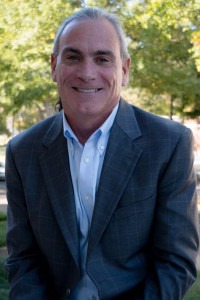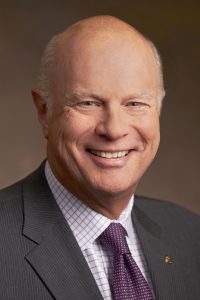From PR Professionals to PR Professors: Mark Harris, Ron Culp and Rick White
Published on April 29, 2020, at 5:50 p.m.
by Janie Creighton.
According to the Merriam-Webster dictionary, a professor is a “faculty member of the highest academic rank at an institution of higher education.” Another definition states, “One that teaches or professes special knowledge of an art, sport, or occupation requiring skill.” Across the globe, professors provide students with an in-depth knowledge of theories, practice and understanding of the specialized industry he or she teaches.
The Plank Center for Leadership in Public Relations’ board of advisors Mark Harris, Ron Culp and Rick White are longtime PR professionals who are now teaching — or have taught — at universities. Each individual contributes valuable knowledge and experience to their students in the classroom.
Mark Harris

Mark Harris is a retired visiting professor at The University of Alabama. Prior to his teaching career, he worked at IBM for 32 years. “When I retired from IBM,” said Harris, “the only plan was to get into decent enough condition to complete a triathlon without embarrassing myself.” While Harris was busy working on his health, Dr. Joe Phelps, then-advertising and PR department chair and a colleague from the Plank Center board of advisors, asked if he would be willing to fill in until they could bring in a full-time replacement.
Harris accepted the job, but he did not take his role as a visiting professor lightly. In fact, Harris said one of the biggest realities of being a professor is the time requirement needed. Before the semester begins, he spends hours developing lesson plans that live up to his standards. During the semester, he dedicates a bulk of his weekends to “provide real, individual feedback” on his students’ work.
Overall, Harris describes his teaching career as an “amazing gift,” and his favorite part of being a professor is going to class every day. He said that his role is to “help students understand the expectations and standards of a professional workplace.” From there, he designs 25 to 30 class sessions to best equip his students so they can exit the semester with a high degree of confidence.
His time at UA is coming to an end, but he said he leaves it with a “full heart.”

Ron Culp
Ron Culp is a professional director for the public relations and advertising graduate program at DePaul University. According to Culp, being a professor was never a part of his career plan. However, since his arrival at DePaul, he said he has felt more than welcomed into the profession by his academic colleagues and students. And he wishes he did it sooner.
Culp said his teaching style is influenced by his former professors who cultivated positive classroom experiences for him as a student, and he attempts to only teach content that will help students advance professionally. Culp believes his front-line experience as a professional is important to his success as a professor: “This makes you far more credible to students who aspire to work in the profession; plus it signals that you’re not going to be drowning them in theory, some of which is no longer relevant in our fast-changing profession.”
Because PR is an industry that is always transforming itself, Culp said he stays up to date with the latest PR trends by reading AdAge, PRWeek and scanning three newspapers — The New York Times, The Wall Street Journal and The Chicago Tribune. He also attends several Page and PRSA meetings, and rarely misses the yearly PRSSA national conference where he presents his mentorship award to an outstanding student mentor.
Finally, when Culp was asked what advice he would give himself as a college student, he shared the importance of intentionality and involvement: “Get to know your professors, join campus organizations and volunteer to help nonprofits. Cram as much into your college career as possible. Each of these experiences will become important stories that will help guide you through your life and career.”
Rick White

Rick White is an adjunct faculty member at the University of North Carolina at Chapel Hill. After White’s corporate career, he returned to North Carolina to retire: “I ended up joining the administration at UNC to help Carolina get through some fairly difficult reputational challenges.” Afterward, he was asked to return to UNC and teach in the Hussman School of Journalism and Media.
White strives to meet his students where they are. His favorite part about being a professor is the intelligence and enthusiasm of his students. “Every day in class is a joy,” said White. The biggest opportunity White faces is the expression of strategic thinking. In order to help his students grow professionally, he treats them as public relations professionals. By doing this, he hopes it will broaden their strategic thinking skills. However, each profession has its challenges. White said one of the challenges he faces is helping students overcome youthful idealism: “Helping students see that there needs to be a balance is sometimes difficult.”
While investing in his students, White maintains his professional growth by reading newspapers, including The Washington Post, The New York Times and Axios. He also is an active member of the Page Society.
Professionals to PR Professors
The path to a career in higher education looks different for everyone. For example, Harris, Culp and White had different degrees and professional careers prior to their time at universities, and none of them considered being a professor. Regardless of the path chosen, professors are vital to the success of students. They provide their students with academic leadership and knowledge, and they possess influence and professionalism in the PR industry.




